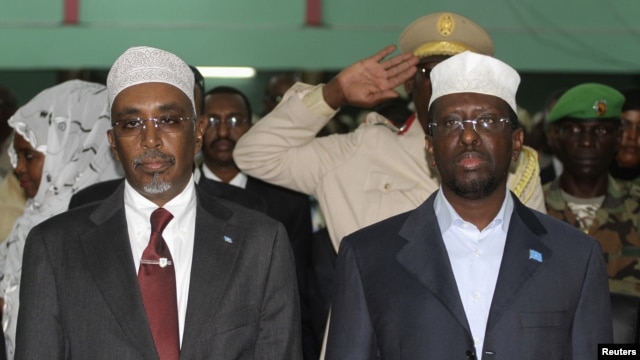Somalia's President Sheikh Sharif Ahmed (R) and Speaker of the Parliament Sharif Hassan Sheikh Adan attend the National Constituent Assembly meeting in the capital Mogadishu, July 25, 2012.

Friday, July 27, 2012
advertisements
After months of wrangling and postponement in Somalia, an 825-member constituent assembly will have the final word on the country's new constitution. Despite some objections, representatives believe the constitution ultimately will be approved. Assembly representatives will have a chance for debate and to add their recommendations before voting "yes" or "no" on whether to adopt the new constitution.
The assembly, which brings together Somali community leaders from the various clans, sub-clans and the diaspora, is part of the process for ending an eight-year political transition and forming a new government.
One member, Ali Abdirahman Ahmed, an elder from the Digil and Mirifle clan, told VOA his clan instructed its representatives to pass the constitution. He said that doing so will help bring an end to the suffering of the Somali people in and out the country.
Making a successful transition
Ahmed said the reason his clan's representatives were told to vote for the adoption of the constitution is because their daughters are giving birth under trees, their sons are dying in the oceans. He said that if you go to every prison in the five continents you find our sons and daughters are languishing in those prisons. He said his nation must find ways to finish this transition so that they can have some sort of accountability in the next government.
The constituent assembly has been postponed several times. It was held up most recently by clan elders who expressed concerns about certain clauses in the constitution and insisted on making changes before it passed.
Mohamed Hassan Haad, the chairman of the Hawiye clan elders, refused to attend the assembly as an observer, and cast doubt on the legitimacy of the process.
"Whatever they are going to work on," Haad said, "there are people who have already worked on that [constitution] and they will be instructed what to do and what to say, and those are some of the things that made us walk out of the meeting hall. They are working under the terms of some politicians who want a position in the government. In such a situation we could not represent our people when such things are taking place."
In previous interviews with VOA, Haad has said his strongest objections are that the constitution grants too many rights for women to run for high office, and that it does not specify what city will be Somalia's capital.
Assembly member Ibrahim Salah, from the Gedo region, said that although the draft is not perfect, members of the assembly are being given a chance to suggest changes.
He said if you look at the draft constitution, since it is written by a human being, certain things can be wrong and others right; it is a not holy book. But when checked, the mistakes are minimal, and changes can be made, he said.
Attempt toward progress
The United Nations helped to draft the constitution and is supporting Somalia's political process.
U.N. Special Representative for Somalia Augustine Mahiga told the constituent assembly that the new constitution recognizes the fundamental importance of Somalia as an Islamic state, blended with modern 21st century society.
He called the constituent assembly the first step toward completing a political transition and forming a new government by August 20.
Somalia has been without a stable central government, and has endured two decades of war and lawlessness, since the ouster of former president Mohamed Siad Barre in 1991.
